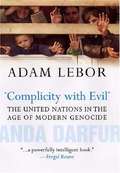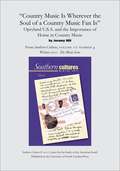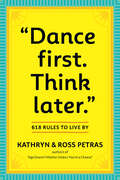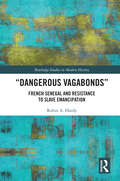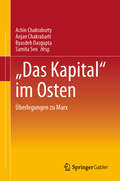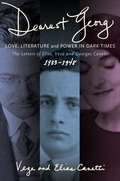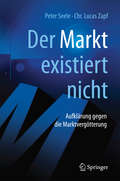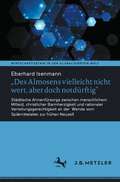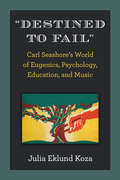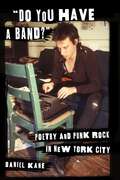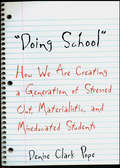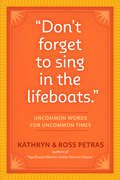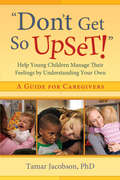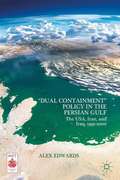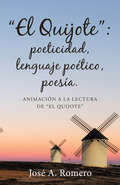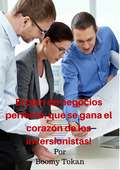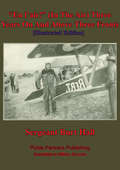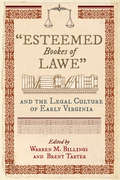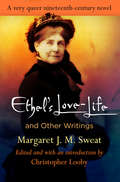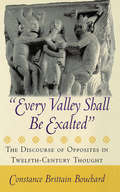- Table View
- List View
"Complicity With Evil": The United Nations in the Age of Modern Genocide
by Adam LeborFrom the killing fields of Rwanda and Srebrenica a decade ago to those of Darfur today, the United Nations has repeatedly failed to confront genocide. This is evinced, author and journalist Adam LeBor maintains, in a May 1995 document from Yasushi Akashi, the most senior UN official in the field during the Yugoslav wars, in which he refused to authorize air strikes against the Serbs for fear they would "weaken" Milosevic. More recently, in 2003, urgent reports from UN officials in the Sudan detailing atrocities from Darfur were ignored for a year because they were politically inconvenient. This book is the first to examine in detail the crucial role of the Secretariat, its relationship with the Security Council, and the failure of UN officials themselves to confront genocide. LeBor argues the UN must return to its founding principles, take a moral stand and set the agenda of the Security Council instead of merely following the lead of the great powers. LeBor draws on dozens of firsthand interviews with UN officials, current and former, and such international diplomats as Madeleine Albright, Richard Holbrooke, Douglas Hurd, and David Owen. This book will set the terms for discussion when UN Secretary General Kofi Annan steps down to make room for a new head of the world body, and political observers assess Annan's legacy and look to the future of the world organization.
"Country Music is Wherever the Soul of a Country Music Fan Is": Opryland U.S.A. and the Importance of Home in Country Music
by Jeremy HillNixon's visit (only five months before his resignation) was seen by national journalists and politicos to be a trip to one of the few places where he would still receive a warm reception, and it was quite warm indeed. Nixon took the stage, played two songs on the piano, and bantered with Roy Acuff."When the Opry changed sites it wasn't without a good deal of growing pains, angst, and rhetoric--but by taking old values to the new venue, not to mention a circle of the original old floor, country music survived the switch.This article appears in the 2011 Music issue of Southern Cultures.Southern Cultures is published quarterly (spring, summer, fall, winter) by the University of North Carolina Press. The journal is sponsored by the University of North Carolina at Chapel Hill's Center for the Study of the American South.
"Dance First. Think Later": 618 Rules to Live By
by Ross Petras Kathryn PetrasTimeless in their wisdom, thought-provoking in their message, surprising in their truth and memorable in their originality, the right words can give direction, inspiration, and sometimes a tangible boost onto the right path. For example, Steve Jobs once read “Stay hungry Stay foolish” on the back cover of The Whole Earth Catalog, and those four words came to guide his life. Created by Kathryn and Ross Petras, connoisseurs of quotes, whose books and calendars have over 56 million copies in print, "Dance First. Think Later." is a collection of the greatest life wisdom from an unexpected group of speakers, doers, and thinkers. There are 618 rules to live by—funny, sly, declarative, thoughtful, offhanded, clever, and always profound:“Watch with glittering eyes the whole world around you, because the greatest secrets are always hidden in the most unlikely places.” —Roald Dahl“If everything is under control, you are going too slow.” —Mario Andretti“Never make a credit decision on a beach.”—Victor J. Boschini“Dance first. Think later. It’s the natural order.”—Samuel Beckett “The only time to eat diet food is while waiting for the steak to cook.” —Julia Child “What you spend years building may be destroyed overnight; build it anyway.” —Mother Teresa And: “Be yourself. Everyone else is already taken.”—Oscar Wilde
"Dangerous Vagabonds": French Senegal and Resistance to Slave Emancipation (Routledge Studies in Modern History)
by Robin A. Hardy"Dangerous Vagabonds" examines the problem of illicit slavery in Senegal following the 1848 emancipation law. Where traditional scholarship relates its persistence to the economic and logistic pressures in the region, as well as a strong indigenous tradition of forced labor, this study goes further to show that inherent factors within the culture of French colonialism made abolishing the institution exceedingly difficult.In 1848, when slavery was abolished across greater France, the practice remained virtually intact in the French colony of Senegal on the west coast of Africa. Slavery would continue to be practiced in the colony and its expanding borderlands until at least 1905, when this study ends. This work takes a multi-faceted approach by examining three aspects of French imperial culture that mitigated slave freedom in Senegal: the views of race and slavery maintained by Senegal’s influential métis (mixed-race) population; French ethnological assessments of the aptitude and capabilities of black West Africans; and related, a trend within French political culture to deny metropolitan rights to the non-white colonized—a phenomenon that intensified in far-flung French territories that were not completely under French control, and where few whites resided.In complexifying post-colonial literature of West Africa, this study will be a useful resource to students and scholars of the history of slavery, colonial history, and West African studies.
"Das Kapital“ im Osten: Überlegungen zu Marx
by Samita Sen Anjan Chakrabarti Achin Chakraborty Byasdeb DasguptaDieses Buch verfolgt einen marxistischen Ansatz mit dem Schwerpunkt auf der Klasse, um über Marx' Kapital im Kontext des Ostens nachzudenken. Es nimmt eine kritische Neubewertung einiger vertrauter Konzepte im Kapital vor und arbeitet Themen heraus, die an dessen Rand liegen. In verschiedenen Aufsätzen wird dieses Grenzgebiet erkundet, um neueKonzepte und Analysemethoden für Marx' Abhandlung im 21. Jahrhundert zu fördern. Jahrhundert voranzutreiben. Damit stellt es einen Fortschritt in der Marxschen Theorie und Politik dar.Das Buch untersucht das Kapital von Marx aus der Perspektive und dem Blickwinkel des Ostens und konzentriert sich auf viele Themen, die an den "Grenzen" des Kapitals liegen, das sich hauptsächlich mit der Entschlüsselung des entwickelten Kapitalismus befasst. Es werden neue Konzepte eingeführt und in Beziehung zu den von Marx vertretenen gesetzt, um unser Verständnis von Wirtschaft, Kapitalismus, Entwicklung und Politik zu verbessern. In dieser Hinsichtbietet das Buch eine Lesart des Kapitals, die sich von den herkömmlichen Überlegungen in der westlichen Welt unterscheidet.Der Umfang ist groß und deckt einen großen Teil des Gebiets von Marx' Kapital ab, wobei auch einige neue Themen im Zusammenhang mit dem Kapital behandelt werden. Der Inhalt gliedert sich in die folgenden Abschnitte: Rezeption des Kapitals im Osten; Wert, Ware, Mehrwert und Kapitalismus; Bevölkerung und Rente im Kapital; und Fragen jenseits des Kapitals.
"Dearest Georg": Love, Literature, and Power in Dark Times
by David Dollenmayer Karen Lauer Vesa CanettiIn 1934, Veza Taubner and Elias Canetti were married in Vienna. Elias describes the arrangement to his brother Georges as a "functional" marriage. Meanwhile, an intense intellectual love affair develops between Veza and Georges, a young doctor suffering fromtuberculosis. Four years later, Veza and Elias flee Nazi-ruled Vienna to London, where they lead an impoverished and extremely complicated marital life in exile. Spanning the major part of Elias's struggle for literary recognition, from 1933, before the publication of his novel, Auto-da-Fé, to 1959, when he finished his monumental Crowds and Power, the Canetti letters provide an intimate look at these formative years through the prism of a veritable love triangle: the newly married Elias has a string of lovers; his wife, Veza, is hopelessly in love with an idealized image of his youngest brother, Georges; and Georges is drawn to good looking men as well as to his motherly sister-in-law. Independently and often secretly, the couple communicates with Georges, who lives in Paris: Veza tells of Elias's amorous escapades and bouts of madness, Elias complains about Veza's poor nerves and depression. Each of them worries about Georges's health-if she could, Veza would kiss away the germs. Georges is an infrequent correspondent, but he diligently stores away the letters from his brother and sister-in-law. In 2003, long after his death, they were accidentally discovered in a Paris basement and comprise not only a moving and insightful document, but real literature.From the Hardcover edition.
"Der Markt" existiert nicht
by Peter Seele Chr. Lucas Zapf Jochen Hörisch Christoph Weber-BergDer Markt diktiert unsere Wirtschaft: Er zwingt Unternehmen zu Entlassungen, scheucht die Politik vor sich her oder reagiert nervös. Doch existiert dieser „Markt“ überhaupt? Und was verbirgt sich dahinter? Peter Seele und Lucas Zapf räumen auf mit dieser Vergötterung eines bewährten Tauschmechanismus zwischen Individuen, Unternehmen und öffentlichen Akteuren. In diesem Buch betrachten sie den Marktbegriff unter logischen Aspekten und untersuchen seine Bedeutung und Verwendung in der Sprache. Mit diesem logischen Blickwinkel fällen sie keine Aussage über ein wahrhaftiges Dasein des Marktes – vielmehr weisen sie darauf hin, wie die Marktvergötterung genutzt wird, um beispielsweise unangenehme Entscheidungen zu legitimieren und die Verantwortung auf einen ominösen Markt abzuwälzen. Sie entwerfen einen freien und aufgeklärten Marktbegriff, der diese riskanten Verzerrungen verhindert.
"Des Almosens vielleicht nicht wert, aber doch notdürftig": Städtische Armenfürsorge zwischen menschlichem Mitleid, christlicher Barmherzigkeit und rationaler Verteilungsgerechtigkeit an der Wende vom Spätmittelalter zur frühen Neuzeit (Wirtschaftsethik in der globalisierten Welt)
by Eberhard IsenmannArmut ist ein universales gesellschaftliches Problem. Die Armenfrage wird in diesem Band anhand sehr verschiedenartiger und zugleich eindringlicher Quellen auf den Ebenen von Religion, Recht, Wirtschaft, Sozialstruktur, obrigkeitlichem Verwaltungshandeln und ausgeprägter sozialpsychologischer Mentalitäten untersucht. Dies geschieht ferner in Verbindung mit vorgegebenen Lehren einer allgemeinen Ethik, der Moraltheologie und eines christlich geprägten Humanismus sowie mit Normen des kanonischen und römischen Rechts. An der Wende vom Spätmittelalter zur frühen Neuzeit mündet die herkömmliche individuelle und kirchliche Caritas in einigen deutschen und flandrischen Städten in einem epochalen Wandel angesichts der hohen Anzahl an Armen und Bettlern, der Ordnungsprobleme des Bettlerwesens, schließlich als unabweisbare Konsequenz von Bettelverboten insbesondere im Gefolge reformatorischer Strömungen in eine kommunal organisierte Armenfürsorge mit zukunftsweisenden Elementen einer modernen Sozialfürsorge.
"Destined to Fail": Carl Seashore’s World of Eugenics, Psychology, Education, and Music
by Julia KozaA little-known fact about the prominent US psychologist and educator Carl E. Seashore (1866–1949) is that he was deeply involved in the American eugenics movement. He was among the US academics to support eugenics long before German Nazis embraced it. A titan in a host of disciplines and a proponent of radical education reform, Seashore used his positional power to promote a constellation of education reforms consistent with central precepts of eugenics. Many of these reforms, including tracking, gifted and talented programs, and high-stakes standardized testing, were adopted and remain standard practice in the United States today. He promulgated the idea that musical talent is biologically inheritable, and he developed the first standardized tests of musical talent; these tests were used by early-twentieth-century researchers in their attempts to determine whether there are race differences in musical talent. Seashore’s ideas and work profoundly shaped music education’s research trajectory, as well as enduring “commonsense” beliefs about musical ability. An intersectional analysis, “Destined to Fail” focuses on the relationship between eugenics and Seashore’s views on ability, race, and gender. Koza concludes that Seashore promoted eugenics and its companion, euthenics, because he was a true believer. She also discusses the longstanding silences surrounding Seashore’s participation in eugenics. As a diagnosis and critique of the present, “Destined to Fail” identifies resemblances and connections between past and present that illustrate the continuing influence of eugenics—and the systems of reasoning that made early-twentieth-century eugenics imaginable and seem reasonable—on education discourse and practice today. It maps out discursive, citational, and funding connections between eugenicists of the early twentieth-century and contemporary White supremacists; this mapping leads to some of Donald Trump’s supporters and appointees.
"Do You Have a Band?": Poetry and Punk Rock in New York City
by Daniel KaneDuring the late 1960s, throughout the 1970s, and into the 1980s, New York City poets and musicians played together, published each other, and inspired one another to create groundbreaking art. In "Do You Have a Band?", Daniel Kane reads deeply across poetry and punk music to capture this compelling exchange and its challenge to the status of the visionary artist, the cultural capital of poetry, and the lines dividing sung lyric from page-bound poem.Kane reveals how the new sounds of proto-punk and punk music found their way into the poetry of the 1960s and 1970s downtown scene, enabling writers to develop fresh ideas for their own poetics and performance styles. Likewise, groups like The Fugs and the Velvet Underground drew on writers as varied as William Blake and Delmore Schwartz for their lyrics. Drawing on a range of archival materials and oral interviews, Kane also shows how and why punk musicians drew on and resisted French Symbolist writing, the vatic resonance of the Beat chant, and, most surprisingly and complexly, the New York Schools of poetry. In bringing together the music and writing of Richard Hell, Patti Smith, and Jim Carroll with readings of poetry by Anne Waldman, Eileen Myles, Ted Berrigan, John Giorno, and Dennis Cooper, Kane provides a fascinating history of this crucial period in postwar American culture and the cultural life of New York City.
"Doctor My Eyes"--The Acquisition of Bausch & Lomb by Warburg Pincus (A)
by Nori Gerardo LietzIn early 2010, senior partners at Warburg Pincus met to review a report on Bausch & Lomb Incorporated, the firm's largest investment at the time. Warburg Pincus had led a group of investors in acquiring Bauch & Lomb on October 26, 2007, taking the company private and becoming its largest and controlling shareholder. Since the acquisition, there had been significant progress at Bausch & Lomb through changes in senior leadership and in its business model. But, shortly after the second anniversary of the investment, the senior partners were beginning to question whether the depth and pace of change was enough. They had some tough decisions to make.
"Does 'Grease Money' Speed Up the Wheels of Commerce?
by Shang-Jin Wei Daniel KaufmannA report from the International Monetary Fund.
"Doing School": How We Are Creating a Generation of Stressed Out, Materialistic, and Miseducated Students
by Denise Clark PopeThis book offers a highly revealing-and troubling-view of today's high school students and the ways they pursue high grades and success. Denise Pope, veteran teacher and curriculum expert, follows five motivated and successful students through a school year, closely shadowing them and engaging them in lengthy reflections on their school experiences. What emerges is a double-sided picture of school success. On the one hand, these students work hard in school, participate in extracurricular activities, serve their communities, earn awards and honors, and appear to uphold school values. But on the other hand, they feel that in order to get ahead they must compromise their values and manipulate the system by scheming, lying, and cheating. In short, they "do school"-that is, they are not really engaged with learning nor can they commit to such values as integrity and community. The words and actions of these five students-two boys and three girls from diverse ethnic and socioeconomic backgrounds-underscore the frustrations of being caught in a "grade trap" that pins future success to high grades and test scores. Their stories raise critical questions that are too important for parents, educators, and community leaders to ignore. Are schools cultivating an environment that promotes intellectual curiosity, cooperation, and integrity? Or are they fostering anxiety, deception, and hostility? Do today's schools inadvertently impede the very values they claim to embrace? Is the "success" that current assessment practices measure the kind of success we want for our children?
"Don't Forget to Sing in the Lifeboats": Uncommon Wisdom for Uncommon Times
by Ross Petras Kathryn PetrasUncommon times call for uncommon wisdom. It’s inspiring to hear from people who’ve graduated from the school of hard knocks, yet kept a sense of humor. People like Twain, Voltaire, Oscar Wilde. People who've said the thing so well that we all wish we'd said it. People who've been there, done that, and refuse to sugarcoat what they've learned. People who know, as Sherry Hochman puts it, that "Every day is a gift—even if it sucks."From Kathryn and Ross petras, curators of craziness (and surprising smarts), comes a timely collection of reassuring reality:"Why is there so much month left at the end of the money?"—John Barrymore"October. This is one of the peculiarly dangerous months to speculate in stocks in. The others are July, January, September, April, November, May, March, June, December, August, and February." —Mark Twain"I know God will not give me anything I can't handle. I just wish he didn't trust me so much."—Mother Teresa"When one burns one's bridges, what a very nice fire it makes."—Dylan Thomas "If you think you have it tough, read history books."—Bill MaherAnd Voltaire: "Life is a shipwreck but we must not forget to sing in the lifeboats."
"Don't Get So Upset!"
by Tamar JacobsonAll childcare professionals were children once, and how their parents responded to their emotional expressions affects how they respond to emotional expressions by children in their own care."Don't Get So Upset!" examines the uncomfortable emotions providers feel--and the inappropriate ways they may respond--when children exhibit strong feelings, especially anger, fear, and grief. The book challenges teachers to reflect on their own emotional histories and to find strategies for responding to children in ways that support children's emotional health and development. It also examines how gender, culture, and societal roles can impact providers' responses to children's emotional expressions.
"Dual Containment" Policy in the Persian Gulf
by Alex EdwardsThis book offers a concise account of US "dual containment" policy towards Iran and Iraq during the 1990s, an overlooked era between the tumult of the liberation of Kuwait and the terrorist attacks of September 11, 2001. In particular, it uses a theoretical framework derived from neoclassical realism to examine the impact of domestic US politics and interest groups on policymaking, as well as perceptions of threat derived from two decades of mutual hostility between the US and Iran.
"Ein Anzug aus Strom": LSD, Kybernetik und die psychedelische Revolution
by Robert FeustelLSD ist das Elixier der psychedelischen 1960er Jahre. Der Stoff verzückt eine ganze Generation und nährt die Hoffnung auf eine Welt jenseits von Macht und Geld. Doch die Gegenkultur dieser Zeit hat einen doppelten Boden: Hinter der bunt-blumigen Fassade trägt ein kybernetisches Denken in Feedbacks und Regelkreisen die Phantasie. LSD scheint den theoretischen Kurzschluss von Mensch und Maschine wahr werden zu lassen. Das Buch erzählt eine andere Geschichte der psychedelischen Bewegung und zeigt, dass die Freiheit der Hippies nicht zuletzt Anpassung an die technischen Gegebenheiten bedeutet und den Weg in die Kontrollgesellschaft ebnet.
"El Otro Lado" Guía del Turista para Abrirse Camino en la Otra Vida
by Lilian G. Selvaggio Richard Martini¿Qué sucede después de que morimos? El autor y premiado cineasta Richard Martini explora inquietantes nuevas evidencias acerca de la vida después de la muerte, mediante la "vida entre vidas", donde se informa que regresamos a encontrar a nuestros seres queridos, almas gemelas y maestros espirituales. Basado en la evidencia de miles de personas que afirman que bajo hipnosis profunda, ellos vieron y experimentaron las mismas cosas básicas acerca de la Otra Vida, el libro entrevista a hipnoterapeutas de todo el mundo, entrenados con el método del cual fue pionero el Dr. Michael Newton, además de examinar sesiones reales de vida entre vidas. El autor accede a realizar él mismo ese viaje, con resultados sorprendentes y cándidos, aprendiendo que estamos completamente conscientes entre nuestras diversas encarnaciones y regresamos para conectarnos con seres queridos y almas gemelas espirituales, y juntos elegimos cómo y cuándo y con quiénes nos reencarnaremos. El autor examina cómo la ley "Kármica" es superada por "El libre albedrío", con almas que eligen vidas difíciles para aprender de su espiritualidad; sin importar qué tan difícil, extraña o compleja pueda parecer una elección de vida, fue realizada de antemano, conscientemente, con la ayuda de seres queridos, almas gemelas y ancianos sabios. Extensivamente investigado, muy sorprendente en su alcance, "El Otro Lado" lleva al lector a un nuevo territorio, valientemente incursionando donde ningún autor lo ha hecho antes, para enlazar las diversas disciplinas de la regresión a vidas pasadas, experiencias cercanas a la muerte, y exploración entre vidas. En las palabras del autor Gary Schwartz, Phd, "una vez que hayas leído este libro, ya nunca más verás el mundo de la misma manera." Elogios para "El Otro Lado": "Richard ha escrito un libro fantástico. Perceptivo, divertido, provocativo y profundo; ¡lo recomiendo absolutamente!" Robert Thurman ("Why the Dalai Lama Mat
"El Quijote": Animación a la lectura de El Quijote
by José A. RomeroEstímulo para gozar con la lectura de El Quijote, el libro de la Literatura, el Libro de la vida, la Poesía moderna instalada en la narración. El Quijote: poeticidad, lenguaje poético, poesía pretende introducir una nueva y sugestiva orientación en los ya numerosos estudios sobre el lenguaje y estilo de El Quijote, al tiempo que persigue constituir un eficaz recurso de animación a la lectura de la magna obra cervantina. <P><P>Este trabajo demuestra con exhaustividad que el lenguaje poético es el motivo lingüístico-estilístico que constituye el esqueleto que sostiene todo el entramado de motivos temáticos y de registros lingüísticos que conforman la inmortal novela. Contiene un detenido análisis de la función poética y su aplicación al estudio y comentario de textos poéticos, que busca ofrecer una eficaz aportación al comentario de textos a partir de criterios objetivos, próximos a los empleados en la ciencia. <P><P> Tras un detenido estudio bibliográfico de los tratados, ensayos y artículos más relevantes sobre el lenguaje y estilo de El Quijote, se comprueba, sobre el texto cervantino, la absoluta presencia de construcciones lingüísticas semejantes tanto desde el punto de vista de su composición como desde la perspectiva de su significado, construcciones que constituyen la esencia de la poesía. <P>Se aborda además El Quijote como obra poética que dejó instaurada ya en el interior de la narración lo que hoy consideramos como poesía moderna. Se incluye finalmente un apéndice que tiene por objeto contribuir a facilitar la lectura a quienes encuentran cierta dificultad inicial con el lenguaje de la gran novela cervantina, con ocasión del IV centenario de la muerte de don Miguel de Cervantes Saavedra, el mayor genio de la literatura universal.
"El plan de negocios perfecto: que se gana el corazón de los inversionistas!"
by Boomy Tokan Osvaldo Javier Pico"El Plan de negocios Perfecto: que se gana el corazón de los inversionistas!" por Boomy Tokan (Incluye contenido de EE. UU. además que los principios enseñados en este libro son transferibles a cualquier país) Cuando alguien menciona el término "Plan de Negocios", la mayoría de las personas se horrorizan! Lo que sigue es "No se cómo hacerlo". Es por eso que decidí escribir este libro lo más claro posible, incluyendo la información que debe considerarse en un plan de negocios. El presente libro intenta ayudar a aquéllos que están elaborando su plan de negocios por primera vez o a los que no hacen planes de negocios con frecuencia. Incluso los que escriben planes de negocios con cierta frecuencia aprenderán una o dos cosas, se los prometo! He incluido dos tipos de Plantillas para Plan de Negocios. La primera es para los que sienten que necesitan un "Plan de Negocios General" y la segunda plantilla es lo que yo llamo una "Plantilla en Power Point" que les puede ayudar a elaborar un plan de negocios en sólo unas horas. Cualquiera que escojan, quiero que sepan que la información contenida en el libro fue usada para muchos negocios que recién iniciaban o que estaban creciendo y estoy seguro de que será de mucho valor. Finalmente, incluí mi correo electrónico personal para los que necesiten más ayuda. Este servicio por ahora es sin ningún costo.
"En L'air!" (In The Air) Three Years On And Above Three Fronts [Illustrated Edition]
by Segeant Bert HallSergeant Bert Hall belonged to an elite brotherhood; he was a founded member of the Lafayette Escadrille which fought in the colours of France during the First World War. Highly decorated individually and as a unit; Hall flew alongside the first American aviators such as Kiffin Rockwell, John Thaw, Victor Chapman and Raoul Lufbery.His first autobiography is gritty and adventure filled; recording his time spent in the French Foreign Legion and in the Trenches before his transfer to flying duties with the Lafayette squadron.Author -- Sergeant Hall, Bert, 1886-1948.Text taken, whole and complete, from the edition published in New York, N.Y., The new library, inc. 1918Original Page Count - 153 pages.Illustrations -- 10 Illustrations.
"Enemy of None but a Common Friend of All"? An International Perspective on the Lender-of-Last-Resort Function
by Curzio GianniniA report from the International Monetary Fund.
"Esteemed Bookes of Lawe" and the Legal Culture of Early Virginia (Early American Histories)
by Brent Tarter Warren M. BillingsVirginia men of law constituted one of the first learned professions in colonial America, and Virginia legal culture had an important and lasting impact on American political institutions and jurisprudence. Exploring the book collections of these Virginians therefore offers insight into the history of the book and the intellectual history of early America. It also addresses essential questions of how English culture migrated to the American colonies and was transformed into a distinctive American culture. Focusing on the law books that colonial Virginians acquired, how they used them, and how they eventually produced a native-grown legal literature, this collection explores the law and intellectual culture of the Commonwealth and reveals the origins of a distinctively Virginian legal literature. The contributors argue that understanding the development of early Virginia legal history—as shown through these book collections—not only illuminates important aspects of Virginia’s history and culture; it also underlies a thorough understanding of colonial and revolutionary American history and culture.
"Ethel's Love-Life" and Other Writings (Q19: The Queer American Nineteenth Century)
by Margaret J. SweatIn a series of lengthy letters, the unsettled and unruly Ethel Sutherland writes to an initially unnamed and ungendered correspondent, and patiently discloses the troubled history of her past romantic attachments to both men and women. Not until the third letter does she reveal that her correspondent is Ernest, the man to whom she is engaged to be married. Wanting to make him understand how all of her past loves are included and sublimated in her love for him, she especially wants to explain how "women often love each other with as much fervor and excitement as they do men"; and although this love is curiously "freed from all the grosser elements of passion, as it exists between sexes," nevertheless it "retains its energy, its abandonment, its flush, its eagerness, its palpitation, and its rapture."Margaret Jane Mussey Sweat (1823-1908), a native of Portland, Maine, and wife of a United States congressman, published Ethel's Love-Life in 1859. The book is sometimes credited as an early—even the first—"lesbian" American novel, but such a label, Christopher Looby observes in his Introduction, somewhat misrepresents what is distinctive and surprising about the book. Ethel's Love-Life confounds our received binary distinctions between the spiritual and the carnal and, indeed, between the sexual and the nonsexual—the boundaries between such categories being not nearly as well-policed at the time as they later became. It is here reprinted, along with Sweat's Verses (1890) and five of her published essays, on Charlotte Brontë, George Sand, the contemporary novel, and the friendships of women.
"Every Valley Shall Be Exalted": The Discourse of Opposites in Twelfth-Century Thought
by Constance Brittain BouchardIn high medieval France, men and women saw the world around them as the product of tensions between opposites. Imbued with a Christian culture in which a penniless preacher was also the King of Kings and the last were expected to be first, twelfth-century thinkers brought order to their lives through the creation of opposing categories. In a highly original work, Constance Brittain Bouchard examines this poorly understood component of twelfth-century thought, one responsible, in her view, for the fundamental strangeness of that culture to modern thinking.Scholars have long recognized that dialectical reasoning was the basic approach to philosophical, legal, and theological matters in the high Middle Ages. Bouchard argues that this way of thinking and categorizing—which she terms a "discourse of opposites"—permeated all aspects of medieval thought. She rejects suggestions that it was the result of imprecision, and provides evidence that people of that era sought not to reconcile opposing categories but rather to maintain them.Bouchard scrutinizes the medieval use of opposites in five broad areas: scholasticism, romance, legal disputes, conversion, and the construction of gender. Drawing on research in a series of previously unedited charters and the earliest glossa manuscripts, she demonstrates that this method of constructing reality was a constitutive element of the thought of the period.
